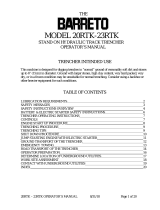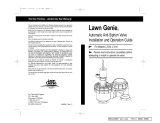Page is loading ...

FormNo.3384-794RevA
RT600TractionUnit
ModelNo.25430—SerialNo.314000001andUp
ModelNo.25430A—SerialNo.314000001andUp
ModelNo.25430C—SerialNo.314000001andUp
ModelNo.25430W—SerialNo.314000001andUp
Registeratwww.Toro.com.
OriginalInstructions(EN)
*3384-794*A

WARNING
CALIFORNIA
Proposition65Warning
Thisproductcontainsachemicalorchemicals
knowntotheStateofCaliforniatocausecancer,
birthdefects,orreproductiveharm.
Theengineexhaustfromthisproduct
containschemicalsknowntotheStateof
Californiatocausecancer,birthdefects,
orotherreproductiveharm.
Becauseinsomeareastherearelocal,state,orfederal
regulationsrequiringthatasparkarresterbeusedonthe
engineofthismachine,asparkarresterisavailableas
anoption.Ifyourequireasparkarrester,contactyour
AuthorizedToroServiceDealer.
Important:ItisaviolationofCaliforniaPublic
ResourceCodeSection4442touseoroperatetheengine
onanyforest-covered,brush-covered,orgrass-covered
landwithoutasparkarrestermufermaintainedin
workingorder,ortheengineconstricted,equipped,and
maintainedforthepreventionofre.Otherstatesor
federalareasmayhavesimilarlaws.
GenuineTorosparkarrestersareapprovedbytheUSDA
ForestryService.
TheenclosedEngineOwner’sManualissuppliedfor
informationregardingtheUSEnvironmentalProtection
Agency(EPA)andtheCaliforniaEmissionControl
Regulationofemissionsystems,maintenance,and
warranty.Replacementsmaybeorderedthroughthe
enginemanufacturer.
Introduction
Thismachineisdesignedtodigtrenchesinsoiltobury
cablingandpipingforvariousapplications.Itisnotintended
tocutrock,wood,oranyothermaterialotherthansoil.
Readthisinformationcarefullytolearnhowtooperateand
maintainyourproductproperlyandtoavoidinjuryand
productdamage.Youareresponsibleforoperatingthe
productproperlyandsafely.
YoumaycontactTorodirectlyatwww .Toro.comforproduct
andaccessoryinformation,helpndingadealer,ortoregister
yourproduct.
Wheneveryouneedservice,genuineToroparts,oradditional
information,contactanAuthorizedToroServiceDealer
orToroCustomerServiceandhavethemodelandserial
numbersofyourproductready.
Figure1illustratesthe
locationofthemodelandserialnumbersontheproduct.
Writethenumbersinthespaceprovided.
Figure1
1.Locationofthemodelandserialnumberplate
ModelNo.
SerialNo.
Thismanualidentiespotentialhazardsandhassafety
messagesidentiedbythesafetyalertsymbol(Figure2),
whichsignalsahazardthatmaycauseseriousinjuryordeath
ifyoudonotfollowtherecommendedprecautions.
Figure2
1.Safetyalertsymbol
Thismanualuses2wordstohighlightinformation.
Importantcallsattentiontospecialmechanicalinformation
andNoteemphasizesgeneralinformationworthyofspecial
attention.
Contents
Introduction..................................................................2
Safety...........................................................................3
.............................................................................4
ElectricalLineSafety...............................................6
GasLineSafety.......................................................6
CommunicationLineSafety......................................6
WaterLineSafety....................................................6
SafetyandInstructionalDecals.................................7
ProductOverview.........................................................14
Controls...............................................................15
InstrumentCluster..............................................15
TractionControls...............................................18
AttachmentControlPanel....................................19
OperatorSeatandSeatBelt.................................20
©2014—TheToro®Company
8111LyndaleAvenueSouth
Bloomington,MN55420
2
Contactusatwww.Toro.com.
PrintedintheUSA
AllRightsReserved

Specications........................................................21
Attachments/Accessories........................................21
Operation....................................................................22
PreparingforWork.................................................22
AddingFueltotheEngine.......................................22
CheckingtheEngineOilLevel.................................23
CheckingtheHydraulicFluidLevel...........................24
InspectingtheMachineDaily...................................25
StartingtheEngine.................................................25
SettingtheEngineSpeed.........................................25
StoppingtheEngine...............................................26
BreakinginaNeworRebuiltEngine.........................26
OperatingtheMachineinExtreme
Conditions.........................................................26
OperatingtheParkingBrake....................................27
DrivingandStoppingtheMachine............................27
OperatingtheTransmission.....................................28
PreparingtoOperatetheMachine.............................29
UsingtheBackllBlade...........................................29
TransportingtheMachine........................................30
CompletingtheWorkfortheDay.............................32
CompletingtheProject...........................................32
Maintenance.................................................................33
RecommendedMaintenanceSchedule(s)......................33
PremaintenanceProcedures........................................34
GeneralSafety........................................................34
Lubrication...............................................................34
GreasingtheMachine.............................................34
EngineMaintenance..................................................36
AccessingtheEngine..............................................36
ServicingtheEngineOilandFilter............................38
ServicingtheAir-cleanerSystem...............................40
FuelSystemMaintenance...........................................43
ServicingtheFuelSystem........................................43
ElectricalSystemMaintenance....................................46
MaintainingtheBattery...........................................46
DriveSystemMaintenance.........................................49
ServicingtheTires..................................................49
ServicingtheAxlesandtheTransmission...................50
CoolingSystemMaintenance......................................55
ServicingtheCoolingSystem...................................55
BeltMaintenance......................................................59
ServicingtheEngineDriveBelt................................59
ReplacingtheEngineDriveBelt...............................60
HydraulicSystemMaintenance....................................62
ServicingtheHydraulicSystem.................................62
ROPSMaintenance....................................................65
CheckingandServicingtheROPS.............................65
Cleaning...................................................................66
RemovingDirtandDebrisfromtheMachine.............66
Storage........................................................................67
PreparingforSeasonalStorage.................................67
Troubleshooting...........................................................68
Safety
Improperlyusingormaintainingthismachinecan
resultininjury.Toreducethepotentialforinjury,comply
withthesesafetyinstructionsandalwayspayattentionto
thesafetyalertsymbol(Figure2),whichmeansCaution,
Warning,orDanger—personalsafetyinstruction.Failure
tocomplywiththeinstructionmayresultinpersonal
injuryordeath.
Important:Thismachinewasmanufacturedaccording
totheappropriateregulatorystandardsineffectatthe
timeofmanufacture.Modifyingthismachineinany
waymaycauseittobeoutofcompliancewiththose
standardsandwiththeinstructionsinthis
Operator’ s
Man ual.
Modicationstothismachineshouldbemade
onlybyanAuthorizedToroServiceDealer.
WARNING
Welding,cutting,ordrillingcastductileironparts
ofthemachinecouldcausethemtobreakduring
operation,whichinturncouldresultininjuryor
death.
Donotweld,cut,ordrilltorepairortoattachitems
tocastductileironpartsonthismachine.
Alwaysfollowallsafetyinstructionstoavoidseriousinjury
ordeath.
Youcanpreventandareresponsibleforinjuriesoccurringto
yourselfandtoothersandfordamagetoproperty.
Donotusethismachineforapplicationsotherthanthose
whicharedescribedinthismanual.
Beforeoperatingthismachineforthepurposeoftrenching,
drilling,orotherconstructionwork,itisyourresponsibility
toknowwhereallutilitylinesareburiedintheprojectarea
andtoavoidthem.
Alwaysensurethatalllocalutilitycompaniesmark
thelocationoftheirlines.IntheUSAandCanada,
calla“One-callSystemDirectory”service.Inthe
USA,call811oryourlocalnumber.Ifyoudonotknow
yourlocalnumber,callthenationalnumber(USAand
Canadaonly)at1-888-258-0808.Also,contactanyutility
companiesthatarenotparticipantsofthe“One-call
SystemDirectory”service.
Checkwithlocalauthoritiesforalllawsandregulationsthat
requireyoutolocateandavoidexistingutilities.
Refertothefollowingtablefortheproperutilitylineandthe
correspondingutilitylinecolor(USAandCanadaonly):
3

UtilityLine
Color
ElectricRed
Telecommunication,alarmorsignal,cables,
orconduit
Orange
Naturalgas,oil,steam,petroleum,orother
gaseousorammablematerial
Yellow
SeweranddrainGreen
DrinkingwaterBlue
Reclaimedwater,irrigation,andslurrylinesPurple
TemporarysurveymarkingsPink
ProposedexcavationlimitsWhite
Afterlocatingalltheutilitylines,carefullydigaholetothe
utilitylinetoverifythelocationandthedepthoftheline.
Training
•ReadtheOperator'sManualandothertrainingmaterial.If
theoperator(s)ormechanic(s)cannotreadEnglish,itis
theowner'sresponsibilitytoexplainthismaterialtothem.
•Becomefamiliarwiththesafeoperationoftheequipment,
operatorcontrols,andsafetysigns.
•Alloperatorsandmechanicsshouldbetrained.The
ownerisresponsiblefortrainingtheusers.
•Neverletchildrenoruntrainedpeopleoperateorservice
theequipment.Localregulationsmayrestricttheageof
theoperator.
•Ensurethatyouunderstandthehandsignalsusedonthe
jobsite.Followtheinstructionsofthesignalperson.
Preparation
•Beforeusingthemachine,havetheareamarkedfor
undergroundutilities,anddonotdiginmarkedareas.
Also,beawareofthelocationofobjectsandstructures
thatmaynotbemarked,suchasundergroundstorage
tanks,wells,andsepticsystems.
•Evaluatetheterraintodeterminewhataccessoriesand
attachmentsareneededtoproperlyandsafelyperform
thejob.Useonlyaccessoriesandattachmentsapproved
bythemanufacturer.
•Markthejobsiteclearlyandkeepbystandersaway.
•Reviewthejobsitehazards,safetyandemergency
procedures,andpersonnelresponsibilitieswithall
workersbeforebeginningthework.
•Wearappropriateclothing,includinghardhat,safety
glasses,longpants,safetyshoes,andhearingprotection;
somejobsmayalsorequirethatyouwearareectivevest
and/orarespirator.Securelonghair,looseclothing,and
jewelrytopreventthemfromgettingtangledinmoving
parts.
•Beforeoperatingthemachinewithanattachment,ensure
thattheattachmentisproperlyinstalled.
•Useextracarewhenhandlingfuels.Theyareammable
andvaporsareexplosive.
–Useonlyanapprovedcontainer.
–Donotremovethefuelcaporaddfuelwiththe
enginerunning.Allowtheenginetocoolbefore
fueling.Donotsmokenearthemachinewhilethe
engineisrunning.
–Donotrefuelordrainthemachineindoors.
•Checkthattheoperator'spresencecontrols,safety
switches,andshieldsareattachedandfunctioning
properly.Donotoperatethemachineunlessthese
controls,switches,andshieldsarefunctioningproperly.
GeneralOperation
•Alwayswearaseatbeltwhenoperatingamachinewith
aROPS.
•Donotrunanengineinanenclosedarea.
•Donotoperatethemachinewithouttheguardssecurely
inplace.Ensurethatallinterlocksareattached,adjusted
properly,andfunctioningproperty.
•Decreasethegroundspeedofthemachineanduse
cautionwhenmakingturnsandcrossingroadsand
sidewalks.
•Donotoperatethemachinewhileundertheinuence
ofalcoholordrugs.
•Ensurethattheareaisclearofotherpeoplebefore
operatingthemachine.Stopthemachineifanyoneenters
thearea.
•Excessivevibrationfromatrencheroraplowcancausea
trench,anoverhang,orahighbanktocollapse,resulting
inpossibleinjuryordeath.
•Ifyourviewoftheworkareaisnotclear,alwayshavea
signalpersondirectthemovementofthemachine.
•Donotleavearunningmachineunattended.Stopthe
engineandremovethekeywheneveryouleavethe
machine.
•UseonlyToro-approvedattachments.Attachmentscan
changethestabilityandtheoperatingcharacteristicsof
themachine.
•Watchfortrafcwhenoperatingthemachinenearor
acrossroadways.
•Ensurethatyouoperatethemachineinareaswherethere
arenoobstaclesincloseproximitytoyou.Failureto
maintainanadequatedistancefromtrees,walls,andother
barrierswhileoperatingthemachinemayresultininjury
and/ordamage.Operatethemachineonlyinareaswhere
thereissufcientclearanceforyoutosafelymaneuver
theproduct.
•Locatethepinchpointareasmarkedonthemachineand
attachments,andkeephandsandfeetawayfromthese
areas.
•Lightningcancausesevereinjuryordeath.Iflightning
isseenorthunderisheardinthearea,donotoperate
themachine;seekshelter.
4

SlopeOperation
Slopesareamajorfactorrelatedtoloss-of-controland
tip-overaccidents,whichcanresultinsevereinjuryordeath.
Allslopesrequireextracaution.
•Avoidoperatingthismachineonslopes,ifpossible.
•Keepallmovementsonslopesslowandgradual.Donot
makesuddenchangesinspeedordirection.
•Avoidstartingorstoppingthemachineonaslope.Ifthe
machinelosestraction,keeptheheavyendofthemachine
uphillandproceedslowly,straightdowntheslope.
•Avoidturningthemachineonslopes.Ifyoumustturn,
turnslowlyandkeeptheheavyendofthemachineuphill.
•Donotoperatethemachineneardrop-offs,ditches,or
embankments.Themachinecouldsuddenlyturnoverif
atiregoesovertheedgeofaclifforditch,orifanedge
cavesin.
RolloverProtectionStructure(ROPS)
System
•BeforeoperatingamachinewithaROPS(rollover
protectionstructure),ensurethattheseatbeltisingood
conditionandissecurelyattachedtothemachine.
•InspecttheROPSattheintervalrecommendedinthis
manualorwhentheROPShasbeeninanaccident.
•RepairadamagedROPSusingonlygenuineToro
replacementparts;donotrepairormodifytheROPS.
•Checkcarefullyforoverheadclearances(i.e.branches,
doorways,electricalwires)beforedrivingunderany
objectsanddonotcontactthem.
•DonotremovetheROPSexceptwhenservicingor
replacingit.
•Donotaddweighttothemachinethatexceedsthegross
weightdisplayedontheROPSlabel.
TransportingSafety
Whenyoutransportthemachinetoorfromthejobsite,
observethefollowingsafetyprecautions:
•Donotcarrypassengersonthemachine.
•Keepallbystandersawaywhileyouaremovingthe
machine.
•Usecarewhenloadingorunloadingthemachineintoa
trailerortruck.
•Watchfortrafcwhenyouarecrossingroadwayswith
themachine.
•Checkforoverheadclearances(i.e.,branches,doorways,
electricalwires)beforedrivingunderanyobjects,anddo
notcontactthem.
MaintenanceandStorage
•Lowertheattachment(s),stoptheengine,waitforall
movingpartstostop,andremovethekeywheneveryou
adjust,clean,orrepairthemachine.
•Donottouchpartsthatmaybehotfromoperation.
Allowthemtocoolbeforeattemptingtomaintain,adjust,
orservicethemachine.
•Cleandebrisfromattachments,drives,mufers,and
enginetohelppreventres.Cleanupoilandfuelspills.
•Lettheenginecoolbeforestoring,anddonotstorethe
machinenearanopename.
•Parkthemachineonlevelground.
•Donotallowuntrainedpersonneltoservicethemachine.
•Usejackstandstosupportcomponentswhenrequired.
•Carefullyreleasepressurefromcomponentswithstored
energy.
•Keephandsandfeetawayfrommovingparts.Ifpossible,
donotmakeadjustmentswiththeenginerunning.
•Keepallpartsingoodworkingconditionandallhardware
tightened.Replaceallwornordamageddecals.
•Keepnutsandboltstight.Keepallequipmentingood
condition.
•Donottamperwithsafetydevices.
•Keepthemachinecleanandfreeofdebris.
•Cleanupoilorfuelspills.
•Useextracarewhenhandlingfuels.Theyareammable
andvaporsareexplosive.
–Useonlyanapprovedcontainer.
–Donotremovethefuelcaporaddfuelwhenthe
engineisrunning.Allowtheenginetocoolbefore
refueling.Donotsmoke.
–Donotrefuelthemachineindoors.
–Donotdrainthefuelindoors.
–Donotstorethemachineorafuelcontainerinside
wherethereisanopename,suchasnearawater
heaterorfurnace.
–Donotllacontainerwhileitisinsideavehicle,
trunk,pickupbed,oranysurfaceotherthanthe
ground.
–Keepcontainernozzleincontactwiththetankduring
lling.
•UseonlygenuineTororeplacementparts.
•Disconnectthebatterybeforemakinganyrepairs.
Disconnectfromthenegativebatteryterminalrstand
fromthepositivelast.Connecttothepositiverstandto
thenegativelast.
•Chargethebatteryinanopenwellventilatedarea,away
fromsparkandames.Unplugthechargerbefore
connectingordisconnectingitfromthebattery.Wear
protectiveclothinganduseinsulatedtools.
•Batteryacidispoisonousandcancauseburns.Avoid
contactwithskin,eyes,andclothing.Protectyourface,
eyes,andclothingwhenworkingwithabattery.
•Batterygasescanexplode.Keepcigarettes,sparks,and
amesawayfromthebattery.
5

•Keepyourbodyandhandsawayfrompinholeleaks
ornozzlesthatejecthigh-pressurehydraulicuid.Use
cardboardorpapertondhydraulicleaks;neveruse
yourhands.Hydraulicuidescapingunderpressurecan
penetrateskinandcauseinjury,requiringsurgerywithin
afewhoursbyaqualiedsurgeon;otherwise,gangrene
mayresult.
•Allowthemachinetocoolbeforestoringit.
ElectricalLineSafety
WARNING
Ifyouleavetheseatofthemachineortouch
anypartofthemachinewhenitischargedwith
electricity,seriousinjuryordeathcouldresult.
Donotleavetheseatofthemachineifthemachine
ischargedwithelectricity.
Note:Immediatelycontacttheproperemergencyandutility
authoritiestosecuretheareainthecasethatthemachineis
chargedandyoucannotleavetheseatofthemachine.
Note:Itispossibletostrikeautilitylinewithoutthemachine
becomingcharged.
•Itislikely(butnotalwaysthecase)thatthepower-source
interrupterorbreakerwilltrip,buttoensureyoursafety,
considerthatthemachinemaybeconductingelectricity.
•Donotattempttoleavethemachine.
Note:Youwillbesafeaslongasyoudonotleavethe
seatofthemachine.
•Touchinganypartofthemachinewhilecontactingthe
groundmayelectricallygroundyou.
•Donotallowanotherindividualtotouchorapproachthe
machinewhenitischarged.
GasLineSafety
WARNING
Ifyoudamageagasline,animmediateexplosion
andrehazardcouldoccur.Leakinggasisboth
ammableandexplosiveandmaycauseserious
injuryordeath.
•Donotsmokewhileoperatingthemachine.
•Shutoffthemachineandremovethekey.
•Removeallindividualsfromtheworkarea.
•Immediatelycontacttheproperemergencyand
utilityauthoritiestosecurethearea.
CommunicationLineSafety
CAUTION
Ifyoudamagetheber-opticcableandlookinto
theexposedhighly-intenselight,youmayharm
youreyes.
•Shutoffthemachineandremovethekey.
•Removeallindividualsfromtheworkarea.
•Immediatelycontacttheproperemergencyand
utilityauthoritiestosecurethearea.
WaterLineSafety
Ifyoudamageawaterline,apotentialoodhazard
couldoccur.
•Shutoffthemachineandremovethekey.
•Removeallindividualsfromtheworkarea.
•Immediatelycontacttheproperemergencyand
utilityauthoritiestosecurethearea.
6

SafetyandInstructionalDecals
Safetydecalsandinstructionsareeasilyvisibletotheoperatorandarelocatednearanyareaofpotential
danger.Replaceanydecalthatisdamagedorlost.
Figure3
DecalMap(T opview)
1.Decal125-8470(underthe
hood)
5.Decal125-84729.Decal125-847813.Decal125-6699
2.Decal125-84836.Decal125-669510.Decal125-847514.Decal125-6698
3.Decal125-66837.Decal125-669711.Decal125-8473
4.Decal125-84848.Decal125-847112.Decal125-6691
7

3 4
Figure4
DecalMap(Left-sideview)
1.Decal125-84793.Decal125-84805.Decal125-84817.Decal125-6689
2.Decal125-49634.Decal125-84826.Decal125-8478
125-4963
1.Warning—donottouchhotsurfaces.
125-6683
1.Pulloutforfastestspeed
4.Decreasespeed
2.Increasespeed
5.Pushinforslowestspeed
3.Enginespeed
8

125-6689
1.Warning—keepawayfrom
hotsurfaces.
2.Cutting/dismemberment
hazard,fan—keepaway
frommovingparts;keep
allguardsandsafety
devicesinplace.
125-6691
1.Slopehazard—donotshiftgearswhilethemachineisona
slope.
125-6695
1.Trencherchain—forward
9.Engagethevibratoryplow
2.Backllblade—pivotleft
10.Trencherchain—reverse
3.Backllblade—raise11.Backllblade—tiltright
4.Backllblade—pivotright12.Backllblade—tiltleft
5.Backllblade—oat
13.Trencher—lower
6.Backllblade—lower
14.Trencher—raise
7.Fastforward15.Rearsteeringleft
8.Fastreverse16.Rearsteeringright
9

125-6697
1.Rearwheelsposition
indicator—rearwheels
turnedtotheright
3.Rearwheelsposition
indicator—rearwheels
turnedtotheleft
2.Rearwheelsposition
indicator—rearwheels
straightahead
125-6698
1.Slow5.Machinedirectionof
motion
2.Clutch
6.Fastreverse
3.Fast
7.Shift(lowrange)
4.Fastforward8.Shift(highrange)
125-6699
1.Warning—readtheOperator’sManual.
6.Warning—wearhearingprotection.
2.Warning—donotoperatethemachineunlessyouaretrained.7.Explosionhazard;electricshockhazard—donotdiguntilyou
havecalledlocalutilities.
3.Warning—alwayswearaseatbeltwhenoperatingthe
machine.
8.ReadtheOperator’sManualforinformationonstartingthe
engine—1)Engagetheparkingbrake;2)Setthetractionand
attachmentstotheNeutralposition;3)Turnthekeytothe
engineStartposition.
4.Warning—keepbystandersawayfromthemachine.9.ReadtheOperator’sManualforinformationonstoppingthe
engine—1)Parkthemachineonalevelsurface;2)Engage
theparkingbrake;3)Setthetractionandattachmentsthe
Neutralposition;4)Lowertheattachments;5)Turnthekeyto
theengineStopposition;6)Removethekeyfromtheignition.
5.Warning—keepawayfrommovingparts;keepallguardsand
safetydevicesinplace.
10

125-8470
1.Disconnectthebattery.
3.On
2.Off
4.Warning—readthe
Operator’sManual.
125-8471
1.Usefrontwheelsteeringonlywhenmovingthemachine
forwardin4thgear.
125-8472
1.Engine—stop3.Engine—start
2.Engine—run
125-8473
1.Explosionhazard—wear
eyeprotection.
3.Firehazard—keepopen
amesaway.
2.Chemicalburn
hazard—ushaffected
areawithwaterandseek
medicalhelp.
4.Poisonhazard—keep
childrenawayfromthe
battery.
11

125-8475
1.Engagetheparkingbrake.2.Disengagetheparking
brake.
125-8478
1.Dieselfuel
125-8479
1.Burnhazardfromcontentsunderpressure—readthe
Operator’sManual.
125-8480
1.Warning—donotclimbonROPS.
125-8483
1.ReadtheOperator’sManualforhydraulicoilinformation.
125-8484
1.12-voltreceptacle
12

BatterySymbols
Someorallofthesesymbolsareonyourbattery.
1.Explosionhazard
6.Keepbystandersasafe
distancefromthebattery.
2.Nore,opename,or
smoking.
7.Weareyeprotection;
explosivegasescan
causeblindnessandother
injuries.
3.Causticliquid/chemical
burnhazard
8.Batteryacidcancause
blindnessorsevereburns.
4.Weareyeprotection9.Flusheyesimmediately
withwaterandgetmedical
helpfast.
5.ReadtheOperator's
Manual.
10.Containslead;donot
discard
13

ProductOverview
Figure5
Leftsideofmachine
1.Nosepanel
5.Backllblade
2.Leftsidepanel
6.Fuelreservoir
3.Grabhandles7.Operatorwalkway
4.ROPSenclosure8.Steps
14

Figure6
Rightsideofmachine
1.Grabhandles5.Steps
2.Rightsidepanel
6.Hydraulicuidsightgauge
3.Nosepanel7.Hydraulic-tankcap
4.Hydraulicuidtank
Controls
Becomefamiliarwithallthecontrols(Figure7)beforeyou
starttheengineandoperatethemachine.
InstrumentCluster
Thewarningandindicatinglights(excepttheengine-intake
preheatlight)comeonwhenyouturnthekeyswitchtothe
Runpositionbeforeyoustart.
WarningLights
ThelocationsoftheselightsareshowninFigure7.
G022146
7
8
1
6
2
3
4
5
Figure7
InstrumentClusterLights
1.Engine-intakepreheat
light
5.Parking-brakesetlight
2.Restricted
hydraulic-pressurelter
light
6.Controls-in-neutrallight
3.Restrictedair-cleanerlight7.Lowengine-oilpressure
light
4.Restrictedhydraulic-return
lterlight
8.Lowhydraulic-pressure
light
•Restrictedhydraulic-pressurelterlight—This
lightturnsonwhentheengineisrunningandthe
hydraulic-pressurelterisrestricted.Iftheengineis
15

runningandthislightturnson,stopthemachineand
replacethehydraulic-pressurelter.
•Restrictedair-cleanerlight—Thislightturnsonwhen
theengineisrunningandtheaircleanerisrestricted.If
theengineisrunningandthislightturnson,stopthe
engineandreplacetheair-cleanerelement.
•Restrictedhydraulic-returnlterlight—This
lightturnsonwhentheengineisrunningandthe
hydraulic-returnlterisrestricted.Iftheengineis
runningandthislightturnson,stopthemachineand
replacethehydraulic-returnlter.
•Lowengine-oilpressurelight—Thislightturnson
whentheengineisrunningandtheengine-oilpressure
isbelowthenormaloperatingrange.Iftheengineis
runningandthislightturnson,stoptheengineandcheck
theengine-oillevel.
•Lowhydraulic-pressurelight—Thislightturnson
whentheengineisrunningandthereisalossofhydraulic
pressure.Iftheengineisrunningandthislightturnson,
stoptheengine,checkthehydraulicuidlevel,andcheck
thehydraulicsystemforleaks.
IndicatingLights
ThelocationsoftheselightsareshowninFigure7.
•Engine-intakepreheatlight—Thislightturnsonwhen
youturnthekeyswitchtotheOnpositionandtheintake
airistoocoldtostarttheengine.Whentheintakeairis
warmenoughfortheenginetostart,thelightturnsoff,
andyoucanthenstarttheengine.
•Parking-brakesetlight—Thislightturnsonwhenyou
turnthekeytotheOnpositionandengagetheparking
brake.
•Controls-in-neutrallight—Thislightturnsonwhen
youturnthekeyswitchtotheOnpositionandthe
followingcontrolsareintheNeutralortheStopposition:
–Tractioncontrolpedal
–Utility-tractionlever
–Attachmentcontrollever
Gauges
ThelocationsofthesegaugesareshowninFigure8.
G022145
1
6
2 3 4 5
Figure8
InstrumentClusterGauges
1.Engine-coolant
temperaturegauge
4.Enginehourmeter
2.Voltmeter5.Fuel-levelgauge
3.Enginetachometer
6.Hydraulic-uid
temperaturegauge
•Engine-coolanttemperaturegauge—Thisgauge
indicatesthetemperatureofthecoolantintheengine
coolingsystem.Thetemperaturerangesandthe
conditionsthattheyindicateareasfollows:
Note:Iftheneedleofthisgaugeindicatesthatthe
coolanttemperatureis116°C(241°F)orhigher,stopthe
engineandallowittocool.Thencheckthefollowing:
thecoolantlevel,theradiator(fordebrisinside),the
thermostat,andtheconditionofandtensiononthedrive
belt.
–82°C(179°F)orlower:Lowtemperature
–82to115°C(180°to240°F):Normaloperating
temperature
–116°C(241°F)orhigher:Hightemperature
•Voltmeter—Thisgaugeindicatesthevoltageofthe
batteryorofthebatteryandthealternator.Thevoltage
rangesofthevoltmeterindicatethefollowingconditions
abouttheelectricalsystem:
–11.4voltsorless:Lowvoltageforthebattery
–11.5to12.5volts:Normalvoltageforthebattery
–13.8to14.4volts:Normalvoltageforthebatteryand
thealternator(withthemachinerunning)
–14.5voltsormore:Highvoltageforthebatteryand
thealternator(withthemachinerunning)
Note:Youmuststoptheenginebeforeyoucheck
thechargingsystem.
•Enginetachometer—Thisgaugeindicatestheengine
speedinrevolutionsperminute(rpm).Eachnumberon
thegaugerepresents1000rpm,andeachspaceequals
200rpm.
•Enginehourmeter—Thisgaugeindicatesthetotal
numberofoperatinghoursofthemachinetoatenthof
16

anhour.Usethehourmetertomeasuretheoperating
hoursbetweenmachineserviceintervals.
•Fuel-levelgauge—Thisgaugeindicatestheamountof
fuelinthefueltank.
•Hydraulic-uidtemperature—Thisgaugeindicatesthe
temperatureofthehydraulicuidinthesystem.
ParkingBrakeSwitch
Parkingbrakeswitch—Pushtheswitchuptoapplythe
parkingbrake(Figure9);pushtheswitchdowntorelease
theparkingbrakepedal.
Figure9
1.Parkingbrakeswitch
Note:Theparkingbrakeautomaticallyengageswhenthe
enginestops.
KeySwitch
Thekeyswitch(Figure10)hasthefollowing3positions:
Figure10
1.Keyswitch
•EngineStop—Turnthekeytothispositiontothe
stoptheengine,de-energizetheelectricalsystem,andto
removethekey.
•EngineRun—Turnthekeytothispositiontoenergize
theelectricalsystem.Thekeyreturnstothisposition
afteryoureleasethekeyfromtheStartposition.
•EngineStart—Turnthekeytothispositiontostartthe
engine.
ThrottleKnob
Usethethrottleknob(Figure11)tochangetheenginespeed
asfollows:
Figure11
1.Throttlebutton3.Throttlelock
2.Throttleknob4.Electricalsocket
•Pushthebuttonatthecenteroftheknobwhilepulling
theknobuptoincreasetheenginespeed.
•Pushthebuttonatthecenteroftheknobwhilepushing
theknobdowntodecreasetheenginespeed.
•Rotatetheknobcounterclockwisetomakeasmall
increaseintheenginespeed.
•Rotatetheknobclockwisetomakeasmalldecrease
intheenginespeed.
ThrottleLock
Usethethrottlelock(Figure11)asfollowstoholdthethrottle
inpositionwhileyouareoperatingthemachine:
•Rotatethethrottlelockclockwisetolockthethrottlein
position.
•Rotatethelockcounterclockwisetoreleasethethrottle.
•Tightenthelocktopreventmoisturefromenteringthe
cableandtopreventthecablefromfreezingincold
weather.
12-voltElectricalSocket
Usethe12-voltelectricalsocket(Figure11)topowerpersonal
electronicequipment,suchasacellphone,aradio,oraGPS
device.
17

TractionControls
Important:Thetractioncontrolpedal,the
utility-tractionlever,andtheattachmentcontrollever
mustbeintheNeutralpositionbeforeyoucanstart
theengine.
Important:Youmustsitintheoperatorseattomove
thetractioncontrolsfromtheNeutralpositionandmove
themachine;otherwise,theenginewillstopin1second.
Note:Operationofthetractioncontrolpedaloverrides
operationoftheutility-tractionlever.
TractionControlPedal
Thetractioncontrolpedal(Figure12)controlsthedirection
oftravelandthespeedofthemachine.
Figure12
1.Heelpedal(reverse)2.Toepedal(forward)
Tocontrolthedirectionoftravelandthespeedofthe
machine,dothefollowing:
•Pushthetoepedalforwardtomovethemachine
forward.
•Pushtheheelpedaldowntomovethemachinein
reverse.
•Formaximumspeed,fullypushthepedal.
•Toreducethespeedofthemachineortostopthe
machine,movethepedaltowardtheNeutralposition.
Utility-tractionLever
Note:TheNeutralpositionfortheutility-tractionleveris
detented.Youmustmovetheleveroutofthedetenttomove
theleverforwardorrearward.
Theutility-tractionlever(Figure13)has3positions:Forward,
Neutral,andReverse.
Figure13
1.Handle5.Utility-tractionlever
(neutral)
2.Drivemodeswitch
(transport)
6.Utility-tractionlever
(reverse)
3.Drivemodeswitch(work)
7.Transmissionrangeswitch
4.Utility-tractionlever
(forward)
Usetheutility-tractionleverasfollows:
•Tomovethemachineforward,pushtheleverforward
(awayfromyou).
•Tomovethemachinerearward,pulltheleverrearward
(towardyou).
Note:Thefartheryoupushorpullthelever,thefasterthe
machinemoves.
Note:Theleverlocksintopositionwhenyoureleasethe
lever.
DriveModeSwitch
Thedrivemodeswitch(Figure13)controlsthehydraulic
pressuretothetractionmotorandhas2positions:the
transportmodeandtheworkmode.
Important:Donotchangefromonedrivemodeto
anotherwhilethemachineismoving.
Note:Thedrivemodeswitchisusedinconjunctionwith
thetransmissionrangeswitch.
Tooperatethedrivemodeswitch,dothefollowing:
•Pulltheswitchrearward(towardyou)forworkmode.
•Pushtheswitchforward(awayfromyou)fortransport
mode.
18

TransmissionRangeSwitch
Thetransmissionrangeswitch(Figure13)isusedtocontrol
thegearreductionrangeofthetransmission,andithas2
positions(highandlow).
Important:Donotshiftbetweenthetransmission
rangeswhilethemachineismoving.
Note:Thetransmissionrangeswitchisusedinconjunction
withthedrivemodeswitch.
Tooperatethetransmissionrangeswitch,dothefollowing:
•Presstheswitchtotheright(nearyou)forlowrange.
•Presstheswitchtotheleft(awayfromyou)forhighrange.
AttachmentControlPanel
Theattachmentcontrolpanelislocatedontherightsideof
theoperatorseat(Figure14).
Figure14
1.Backll-bladejoystick
4.Attachmentcontrol
2.Trencherchain
direction/cableplowspeed
control
5.Rear-wheelsteering
control
3.Backlltiltcontrol
BackllBladeJoystick
Usethebackllbladejoystick(Figure14)tooat,raise,lower,
andanglethebackllblade.Operatethejoystickasfollows:
•Pushthejoystickpartiallyforwardtolowertheblade.
•Pushthejoystickallthewayforwardtooattheblade.
•Pullthejoystickbacktoraisetheblade.
•Pushthejoysticktotheright(awayfromyou)toswing
thebladetotheright.
•Pullthejoysticktotheleft(towardyou)toswingthe
bladetotheleft.
BackllBladeTiltLever
Usethebackllbladetiltlever(Figure14)totilttheblade.
Operatetheleverasfollows:
•Pushthislevertotheright(awayfromyou)totiltthe
bladedownontheright.
•Pullthecontrollevertotheleft(towardyou)totiltthe
bladedownontheleft.
AttachmentControlLever
Note:Usetheattachmentcontrollever(Figure14)forthe
trencher.
Operatethecontrolleverasfollows:
•Pushthislevertotheright(awayfromyou)tolowerthe
attachment.
•Pullthelevertotheleft(towardyou)toraisethe
attachment.
Note:Whenyoureleasethelever,themachinemaintains
theattachmentposition.
RearWheelSteeringControlLever
Usetherearwheelsteeringcontrollever(Figure14)tosteer
therearwheels.
•Pushthelevertotheright(awayfromyou)toturnthe
rearwheelstotheright.
•Pullthelevertotheleft(towardyou)toturntherear
wheelstotheleft.
Note:Youcanturnthefrontwheelsbyusingthesteering
wheelonly.
RearAttachmentControlLever
Therearattachmentcontrolleverislocatedontherightside
oftheoperatorseatasshowninFigure15.
19

Figure15
1.Fastforwardchainspeed4.Slowreversechainspeed
orslowplowvibration
2.Slowforwardchainspeed
5.Fastreversechainspeed
orfastplowvibration
3.Neutralposition
•Cableplowoperation(optional)—movethecontrol
levertocontrolthecableplowasfollows:
–Movethecontrolleverrearwardtoactuatethe
vibrationoftheblade;movethecontrolleverfully
rearwardtoincreasethevibration.
–MovethecontrolleverbeyondtheNeutralposition
todecreaseandstopthevibration.
•Trencheroperation—movethecontrollevertocontrol
thetrencherasfollows:
–Movethecontrolleverforwardtoactuatethedigging
chainintheforwarddirection.
–Movethecontrolleverfullytowardthefrontto
increasethechainspeed.
–MovethecontrollevertotheNeutralpositionto
stopthechain.
–Movethecontrolleverrearwardtoreversethe
diggingchaindirection.
Note:Youmustsitintheoperatorseattomovethe
attachmentcontrolleverfromtheNeutralposition;
otherwise,theenginewillstopin1second.
RearWheelPositionIndicator
Thisindicator(Figure16)showsthepositionoftherear
wheelswhenyousettherearwheelpositioncontrol.
Figure16
1.Pointer2.Rear-wheelposition
indicator
OperatorSeatandSeatBelt
SeatInterlockSystem
WARNING
Theseatinterlocksystemprotectstheoperator
frominjury.
Donotdisabletheseatinterlocksystem.
Theseatinterlocksystemrequirestheoperatortositinthe
operatorseatwhileoperatingthismachine.
Note:Theneutralindicatorlightturnsonwhenyouturnthe
keyswitchtotheOnpositionandboththeutility-traction
controlandattachmentcontrolleversareintheNeutral
position.
Note:Iftheoperatordoesnotremainseatedwhenthe
utility-tractionleverisnotintheNeutralposition,theengine
willstopin1second.Donotlayaheavyobjectontheseator
tamperwiththeseatinterlocksysteminanyway.
ForwardandRearwardSeatControl
Tomovetheoperatorseat(Figure17)forwardorrearward,
pullthecontrolbartothelefttoadjusttheseatforwardor
rearward.
20
/





